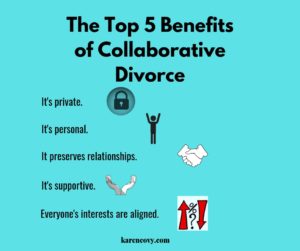Is the Collaborative Divorce Process Best for You?
by Karen Covy
When you’re facing divorce, you’ve got a lot on your mind. You’re worried about money, your kids and your home. Your entire life is up for grabs. Plus your emotions are all over the board – you can go from anger to tears to frustration and back again in a nanosecond. With all that you have going on, it’s not surprising that figuring out whether the Collaborative Divorce Process is right for you isn’t exactly your top priority.
Yet, according to divorce experts, it should be. (Or at least it should be on your shortlist of things to think about.)
Here’s why.
The way you go through your divorce will directly affect your life after divorce.
If your divorce turns into the War of the Roses, you can’t expect that your life after divorce will be all sunshine and kittens. (Sorry!) If you fight your way through your divorce, you will likely continue fighting after your divorce – especially if you have kids.
On the other hand, if you can divorce amicably, your chances of having a reasonably peaceful life after your divorce improve dramatically. Your post-divorce co-parenting will be easier. And, as an added bonus, it will probably cost you a lot less to get divorced.
The Collaborative Divorce Process is aimed at helping you achieve all of your goals. It can help get you divorced like a civilized human being. It will save you money. Best of all, it can make co-parenting after your divorce much less stressful.
But, if you’re like most people, you probably have questions about Collaborative Divorce. After all, Collaborative Divorce is “the new kid in town” when it comes to divorce processes.
So here are answers to some of the most frequently asked questions about Collaborative Divorce.
Answers to Your Top 5 Questions about Collaborative Divorce
1. How Much Does a Collaborative Divorce Cost?
As with every other kind of divorce, the answer to “How much does a Collaborative Divorce cost?” is: It depends.
Divorce professionals typically charge by the hour in Collaborative Divorce cases just like they charge by the hour in traditional divorce cases. That means that the more you and your spouse argue, the longer your divorce will take and the more it will cost.
However, because Collaborative Divorce uses a team approach, it is often more efficient than divorce litigation. That efficiency saves you money.
Since each divorce professional only handles the issues that are within his/her area of expertise, those issues are often resolved more quickly. What’s more, using the right professionals to handle each aspect of your divorce gives you the benefit of getting truly qualified advice in every area of your divorce.
Another way the Collaborative Process saves you money is because it is less formal than traditional divorce litigation. It’s easier to exchange financial information when you’re not in court. Your lawyers also don’t have to go to court every month for endless status conferences because in a Collaborative Divorce your case isn’t filed in court until you’re ready to hold the final hearing.
All of that saves you money.
Collaborative Divorce also saves you money in a less obvious, but equally important way. It helps keep you and your spouse out of court AFTER your divorce is over.
Although most people don’t realize it, a significant percentage of divorced couples end up back in court, fighting again, after their divorce is over! That doesn’t happen nearly as often with Collaborative Divorce as it does with a traditional divorce.
2. How is the Collaborative Divorce Process Different from Other Divorce Processes?
The biggest difference between Collaborative Divorce and every other kind of divorce is the agreement that everyone (including the lawyers) must sign at the beginning of the Collaborative Divorce process.
That agreement (which is called a “Participation Agreement”) states that if the Collaborative Process does not work, and either spouse decides to go to court, then all of the divorce professionals have to withdraw. The couple must then find new lawyers to represent them in court.
Not surprisingly, many divorce lawyers aren’t excited about signing the Participation Agreement.
Trial lawyers can give you a thousand reasons why requiring them to bail if your divorce negotiations fail. The biggest reason is that starting all over again with new lawyers is time-consuming and expensive.
Those lawyers are absolutely right.
Starting all over again with new lawyers IS time-consuming and expensive. That’s exactly the point.
When fighting in court costs you time and money, you become less likely to do it. That keeps you at the negotiating table when the negotiations get rough.
When fighting in court makes lawyers lose their clients, and therefore their fees, lawyers become less likely to stir the pot. They start looking for creative ways to end their client’s conflicts, rather than jack them up.
3. Collaborative Divorce vs. Traditional Divorce: What’s Better?
Like everything else, the answer to the question, “Which is better: Collaborative Divorce or traditional divorce?” is: “It depends.” It depends on you, your family and your situation.
The first thing you need to consider when deciding whether you want a Collaborative Divorce or a more traditional divorce is whether your spouse will be on board with your decision.
The Collaborative Divorce Process is voluntary. If your spouse won’t agree to pursue a Collaborative Divorce then you’re going to be stuck litigating your divorce.
Another important factor to consider is the level of co-operation you expect to get from your spouse.
Producing financial information in a Collaborative Divorce is voluntary. That doesn’t mean you can’t get the information you need. It also doesn’t mean that you and your spouse don’t have to produce your financial information to each other and to your attorneys. You do.
But because you’re not in court, there is no judge who will FORCE you to produce full and complete financial information to each other.
If you believe that your spouse is hiding money or won’t produce his/her complete financial information to you without a fight, then the Collaborative Process is NOT for you. (Sorry!)
Another thing you want to consider when deciding the type of divorce process you want to use is the level of control you want to have in your divorce.
When you go to court, the judge is in control of your divorce. You have to follow the court rules. You have to deal with the court’s schedule.
In a Collaborative Divorce, you and your professional team control your divorce. You work at your own speed.
If being in control matters to you, then you might want to avoid litigating your divorce in court.
4. Collaborative Divorce vs. Mediation: What’s Better?
Both Collaborative Divorce and divorce mediation are alternative dispute resolution processes. That means they are both alternatives to going to court.
In many ways, the benefits of any court alternative are similar.
Staying out of court gives you more privacy and control over your divorce. You don’t have to follow the court rules, so things can happen more quickly and with less “pomp and circumstance.” You have the freedom to be more creative in the settlement you ultimately make.
At the same time, some of the drawbacks are similar too.
Both mediation and the Collaborative Divorce Process are voluntary. If your spouse won’t agree to participate in them, they won’t work.
Sure, some judges will ORDER you and your spouse to go to mediation, or to mediate certain issues. But, while a judge can force you to go to mediation, s/he can’t force you to make an agreement. So if either you or your spouse won’t mediate in good faith, mediation is useless.
But even though Collaborative Divorce and mediation are similar in many ways, they are also different. The primary difference is the level of support that each process gives you.
If you mediate your divorce, your attorney may not be present with you during your mediation sessions. In the Collaborative Divorce Process, your lawyer will usually always be with you while you’re negotiating.
In mediation, you won’t normally have a divorce coach or financial neutral present. That means that you won’t have someone in your mediation session who can help you diffuse tense negotiations. You also won’t have a financial person present who can advise you of the financial implications of your settlement options.
The bottom line is that mediation is less supported (and less expensive). Collaborative Divorce is more supported (and usually more expensive).
5. How Long Does a Collaborative Divorce Take?
Like every other divorce process, the length of time the Collaborative Divorce Process takes depends on how much you and your spouse argue and fight. The more you argue and fight, the longer your divorce will take.
While lots of people think that in Collaborative Law, no one fights, nothing could be further from the truth!
Just because, in a Collaborative Divorce, you are trying to end your marriage in a more respectful way, that doesn’t mean for a moment that you and your spouse will always automatically agree on everything!
There is conflict and disagreement in a Collaborative Divorce just like there is in any other kind of divorce.
The difference lies in how the conflict is handled.
Instead of allowing disagreements to escalate into battles, Collaborative Divorce Coaches help divorcing spouses navigate their disagreements more peacefully. They help divorcing couples manage their emotions and discuss their disagreements calmly. That keeps the level of conflict down.
Unlike in a traditional divorce, lawyers in a Collaborative Divorce also help reduce – rather than increase – conflict. Because the Collaborative Lawyers know they will lose their clients if they end up fighting in court, the lawyers encourage clients to act rather than just react. They don’t have the same incentive to escalate emotional situations so that divorces take longer and cost more.
Even still, if a couple has a lot of issues to resolve, or insists on fighting about everything, their divorce will take time. That’s true no matter which divorce process they use.
The Bottom Line About the Collaborative Divorce Process
Figuring out which divorce process will be best for you and your family isn’t totally easy. But it’s not all that hard either.
The first step in making that decision is educating yourself. You have to learn about the pros and cons of each divorce process. This article was a start.
Your next step may be to consult with a Collaborative Divorce practitioner about whether a Collaborative Divorce would work in your case.
CLICK HERE to find a Collaborative Divorce Professional in your area.
__________
This article was reprinted with permission. If you want to read more about Collaborative Divorce and it’s benefits, you can check out the full article here: http://karencovy.com/divorce-questions/collaborative-divorce.
Karen Covy is a Divorce Adviser, Attorney, Mediator & Coach. She has offices in Chicago and Naperville, but she works with divorcing clients around the globe. To read more by Karen Covy go to www.karencovy.com.

